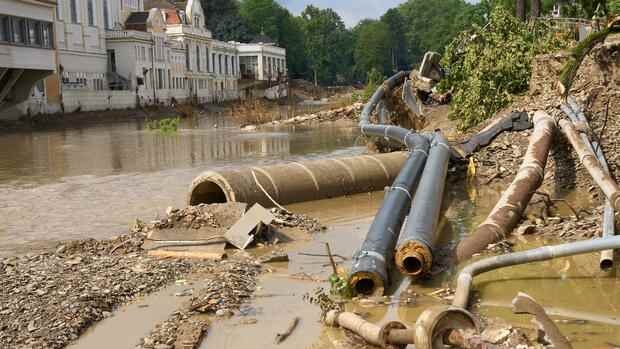Brussels With a program to promote strategically important infrastructure projects, the EU Commission wants to strengthen Europe’s foreign policy weight. The plan provides for guarantees amounting to 40 billion euros for the construction of new roads, rails and data connections, thus providing a European response to the Silk Road initiative of Chinese President Xi Jinping.
The funding commitments form the core of the “Global Gateway” strategy that the Commission intends to present next week. A draft is available to the Handelsblatt. The project is of great importance to Commissioner Ursula von der Leyen. When she took office, she promised a “geopolitical commission” and announced the “Global Gateway” strategy in her most recent address on the State of Europe.
How important the topic is to her, von der Leyen only underlined on Wednesday in a brief statement after a meeting with US President Joe Biden in the White House. She also talked to Biden about infrastructure, she said. “We are in the process of identifying the most promising projects to invest in as part of our joint initiatives.”
The Commission’s strategy paper, however, falls far short of the expectations that the head of the commission aroused with her announcement. It does not list any specific projects, nor does it openly address the systemic conflict with China.
Top jobs of the day
Find the best jobs now and
be notified by email.
Instead, it says: “The EU is striving to balance increasing investments from other regions of the world, to use connectivity to spread its economic and social model and to advance its political agenda.” Connectivity is the Brussels technical term for infrastructure projects.
It is absolutely clear that the initiative is directed against China. Von der Leyen had emphasized the calculation in her speech on the State of Europe: “We are good at financing roads,” she said. “But it doesn’t make sense for Europe to build a perfect road between a Chinese-owned copper mine and a Chinese-owned port.”
The Chinese have created a sphere of power
China has recognized that there is a huge need for infrastructure financing around the world that is not being met by Western development agencies. It is estimated that there is a loss of $ 1,300 billion annually to meet the United Nations’ development goals.
The Chinese have penetrated this gap with targeted offers and have created a sphere of power that extends as far as Europe. In Germany, too, China is expanding its influence through economic cooperation. It was only in September that the Chinese state-owned company Cosco bought 100 million euros in a container terminal in Hamburg.
The initial openness to Chinese investments has since given way to deep concern. In an internal report a few months ago the Foreign Office warned against “Sinocentric structures that are not in our interest”. China used the Silk Road Initiative “to expand political influence globally, to shape global standards and norms according to its own ideas and to advance industrial policy, in particular by promoting state-owned companies”.
Sections of the economy have very similar concerns. European competitors can take part in tenders for Belt-And-Road projects, but they usually get nothing. On the other hand, it is not uncommon for Chinese companies to be involved in European development projects. Coupling development aid with contracts for one’s own companies is expressly forbidden under EU law.
The Federation of German Industry (BDI) has been pointing out this competitive disadvantage for years. In addition, European companies fear losing access to the markets of countries that come into Chinese orbit and adopt the technical standards of the People’s Republic. The BDI has therefore strongly advocated a European infrastructure policy. The disillusionment is likely to be all the greater.
Paper falls short of expectations
Because the Commission’s paper is silent about the crucial economic question of how European companies are integrated into the EU’s infrastructure policy. The funding commitments are also far too small to take on China’s Silk Road initiative.
In addition to the European guarantees of 40 billion euros, there are also several billion euros in grants from the EU budget. The EU also points out that additional investment funds will be available from a development aid program in the coming years. But one looks in vain for precise information on how public aid can be supplemented by private capital.
One thing is clear: Such leverage is urgently needed in order to stand up to China financially. There are no official figures on the spending of the Chinese, but it is estimated that the total value of the Belt and Road projects adds up to more than a trillion dollars.
There are still a few days left before the strategy is presented; the design could still be improved in key areas. But a European diplomat lets disappointment run wild: “The paper is a missed opportunity and a serious setback for von der Leyen’s geopolitical ambitions.”
More: Despite criticism of the Silk Road: EU pushes infrastructure partnership with China
